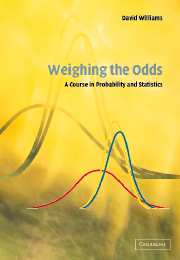Crossref Citations
This Book has been
cited by the following publications. This list is generated based on data provided by Crossref.
Armitage, J. V.
and
Eberlein, W. F.
2001.
Elliptic Functions.
2004.
Optimal Measurement Methods for Distributed Parameter System Identification.
p.
339.
Burnham, Kenneth P.
and
Anderson, David R.
2004.
Multimodel Inference.
Sociological Methods & Research,
Vol. 33,
Issue. 2,
p.
261.
Bailey, D. J.
Kleczkowski, A.
and
Gilligan, C. A.
2004.
Epidemiological dynamics and the efficiency of biological control of soil‐borne disease during consecutive epidemics in a controlled environment.
New Phytologist,
Vol. 161,
Issue. 2,
p.
569.
Rodbro, C.A.
Jensen, J.
and
Heusdens, R.
2006.
Rate-distortion optimal time-segmentation and redundancy selection for VoIP.
IEEE Transactions on Audio, Speech and Language Processing,
Vol. 14,
Issue. 3,
p.
752.
Biffis, Enrico
2007.
Pricing of Life Insurance Liabilities.
SSRN Electronic Journal,
Stockton, John K.
Wu, Xinan
and
Kasevich, Mark A.
2007.
Bayesian estimation of differential interferometer phase.
Physical Review A,
Vol. 76,
Issue. 3,
Biffis, Enrico
2008.
Encyclopedia of Quantitative Risk Analysis and Assessment.
Saric, S.
Bab-Hadiashar, A.
and
Hoseinnezhad, R.
2008.
Clamp-Force Estimation for a Brake-by-Wire System: A Sensor-Fusion Approach.
IEEE Transactions on Vehicular Technology,
Vol. 57,
Issue. 2,
p.
778.
Bartošová, Jitka
and
Bína, Vladislav
2009.
Modelling of Income Distribution of Czech Households in The Years 1996-2005.
Acta Oeconomica Pragensia,
Vol. 17,
Issue. 4,
p.
3.
2009.
Bayesian Analysis for the Social Sciences.
p.
535.
Sainudiin, Raazesh
and
York, Thomas
2009.
Auto-validating von Neumann rejection sampling from small phylogenetic tree spaces.
Algorithms for Molecular Biology,
Vol. 4,
Issue. 1,
Hess, K.
Michielsen, K.
and
De Raedt, H.
2010.
Reply to the Comment by A. J. Leggett and Anupam Garg.
EPL (Europhysics Letters),
Vol. 91,
Issue. 4,
p.
40002.
Briche, Elodie
Madelin, Malika
Beltrando, Gérard
and
Kergomard, Claude
2010.
Analyse comparative des températures extrêmes de 1950 a 2100 issues des modèles ARPEGE-Climat et LMD : intérêt pour l’activité viticole champenoise.
Climatologie,
Vol. 7,
Issue. ,
p.
9.
Majda, Andrew J.
and
Gershgorin, Boris
2010.
Quantifying uncertainty in climate change science through empirical information theory.
Proceedings of the National Academy of Sciences,
Vol. 107,
Issue. 34,
p.
14958.
Stern, Julio Michael
2011.
Constructive Verification, Empirical Induction, and Falibilist Deduction: A Threefold Contrast.
Information,
Vol. 2,
Issue. 4,
p.
635.
Majda, Andrew J.
and
Gershgorin, Boris
2011.
Improving model fidelity and sensitivity for complex systems through empirical information theory.
Proceedings of the National Academy of Sciences,
Vol. 108,
Issue. 25,
p.
10044.
Druckmüllerová, Hana
Morgan, Huw
and
Habbal, Shadia R.
2011.
ENHANCING CORONAL STRUCTURES WITH THE FOURIER NORMALIZING-RADIAL-GRADED FILTER.
The Astrophysical Journal,
Vol. 737,
Issue. 2,
p.
88.
von Waldenfels, W.
Wehrse, R.
and
Baschek, B.
2011.
Markov Chain Monte Carlo solutions for radiative transfer problems.
Astronomy & Astrophysics,
Vol. 525,
Issue. ,
p.
A70.
2012.
Coherent Stress Testing.
p.
213.



